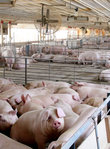



Paustian Enterprises sent 180 hogs to market Sunday from its Walcott farm with little assurance that more will be following soon.
Partner Ross Paustian gave them their last meal Saturday, a lean mix intended to slow gain on hogs already pushing the weight limit on what Tyson will accept at its reopened Columbus Junction plant.
He’s not sure what will become of 1,000 more already at market weight while processing plants dramatically slow production to reduce COVID-19 outbreaks crippling the livestock injury.
Sources interviewed for this story anticipate a slow recovery that will transform U.S. meat production into something new: Different processes and perhaps, even different products.
Those decisions come after the Paustians and almost every livestock producer contemplate the unthinkable: Mass killing of perfectly healthy livestock on a scale never seen in this country.
“They’re about a week past optimum weight. We can go another week, maybe. If they get too big and the packer doesn’t want them, so why keep feeding them? It’s just a loss,” Paustian said as he made Saturday morning rounds in his feed truck.
President Trump last week ordered processing plants open, but local producers say plants must respond cautiously to avoid lengthening the pandemic.
Iowa Gov. Kim Reynolds last week joined the state’s two U.S. senators to ask for a Defense Department order keeping pork-processing plants open. They also asked for financial and regulatory help for farmers forced to destroy animals.
“We ask that resources, including and in addition to those announced by APHIS, be deployed to assist in the humane euthanasia of animals. Resources are critically needed both on farms and in harvest facilities not currently producing food to safely, humanely and efficiently depopulate animals,” they wrote in an April 27 to Vice President Mike Pence.
They’re seeking federal reimbursement, “including costs associated with depopulation and environmentally sound disposal … Pork producers also need protection through legal immunity from attempts by activist organizations to penalize producers who are required to take these actions to protect the welfare of their animals.”
“It makes me sick to my stomach,” said Mike Paustian, of Walcott. He said local meat lockers already are at storage capacity, leaving no room for meat directed to food pantries or elsewhere.
Mike Paustian is president of Iowa Pork Producers. Ross represents House District 92 in the state legislature. He chairs the House Ag Committee and serves on powerful appropriation subcommittees for agriculture and natural resources. All of those titles don’t help much.
“We’re kind of in the same situation every producer is in: On pins and needles, holding our breath, hoping we can get enough pigs to market and keep enough space. But it’s day-to-day at this point,” Mike Paustian said.
Part of his duties include exploring disposal options for producers facing this dilemma the first time. Existing Iowa Department of Agriculture and Natural Resources guidelines cannot accommodate the volume that may be needed.
“We certainly don’t want producers to feel like they’re all alone on this,” Mike Paustian said. “There’s no one-size-fits-all situation there. Only certain soil types are appropriate for burial.
“Work is being done to see if a centralized location could be set up. Also, people are looking at whether landfills are able to take animals. It’s going to require lots of different solutions, Mike Paustian said.
Paustian Enterprises just completed four finishing barns, giving them more room for nursery pigs on the six-month journey from birth to market. That will buy them some time.
Processors are reopening at 50-percent capacity, slowing down lines, spacing workers, and closing a day a week for sanitation. COVID-19 cannot infect meat, but it is decimating ranks of workers who producers acknowledge are the lifeblood of the industry.
“Worker safety has to be No. 1,” Mike Paustian said. He estimated Iowa pork producers have 40,000 pigs per day “not going to market that should be. There’s no way to make up for that loss of processing capacity.”
“At least green cards for agriculture are still coming through,” said Joan Maxwell, a partner with her husband at Cinnamon Ridge Farms, a Donahue-based dairy farm that also produces beef and hogs.
Secretary of State Mike Pompeo last week confirmed consulates are waiving in-person interviews for most foreign workers seeking temporary ag employment in the U.S. Most are intended for seasonal harvesting help.
Iowa meatpacking plants decimated by virus infections rely heavily on foreign-born workers. The Centers for Disease Control teams that conducted plant inspections in March urged more precautions, including safety warnings presented in languages other than English, and using more diagrams and symbols than text.
Tyson Foods operates eight plants in Iowa, including Columbus Junction, and one in Joslin, Ill. The company has followed the CDC recommendations and on Friday, commended government orders to reopen.
“The U.S. government took decisive action to recognize the essential work of our company by prioritizing support for meat and poultry processors and clarifying the standards America should follow to return workers safely back to the workplace … Because make no mistake: The health and well-being of our team members and their loved ones is, and remains, our priority,” the company said in a May 1 statement on its website. “As we’ve shown in recent days, we will not hesitate to idle any plant for deep cleaning when the need arises.”
Ross Paustian, who has toured processors as a customer and legislator, said the workforce “is the lifeblood of a packing plant.”
“They tried to put up some plastic barriers between workers and staggering when they go on break. It’s tough. How many will get sick? I would hope not that many,” he said.
Slowing the spread of the disease through packing plants is one key to increasing processing and reducing the need for euthanizing herds.
Mike Paustian said other keys include changing production and even products.
“There’s talk about trying to eliminate some of the deboning and extra processing, to send out products not quite as processed into final form. But they have to have a market for that, too,” Mike Paustian said.
Beef producers
Iowa beef producers face the same dilemma, but not the urgency since cattle are not raised in confinement barns.
Iowa Cattlemen’s Association board member Russ Cook, of Mechanicsville, estimated some producers can wait a month more before facing tough decisions on market-ready cattle.
“We’re a little bit better off than the hog industry, because they’re in finishing buildings. They’ve got baby pigs waiting to come,” said Cook, who represents region 16, including Scott County.
Cattle producers can continue backgrounding, keeping animals foraging in pastures before moving them to feed lots, he said.
“A bunch of guys have tried to change rations to slow these cattle up until they can get them sold. That will work to a certain extent,” Cook said.
“I don’t think there will be so much euthanizing in the cattle business. With that being said, it really depends on what happens here down the road. If we keep having to shut packing plants down every three or four days for cleaning, and already the chain speed is way slower, that automatically backs everything up.”
Dairy
Dairy farmers John and Joan Maxwell say their industry is struggling differently from livestock producers.
Shutdowns caused by the virus eliminated restaurant, school and other institutional dairy consumption. That hits liquid milk producers hardest.
The Maxwell’s Cinnamon Ridge produces high-fat milk for Brewster Cheese in Stockton, Ill., the nation’s largest supplier of Swiss.
“They’re going as if business as usual because they’re mostly in grocery stores. That has been a good business right now,” John Maxwell said.
But bulk milk prices remain dictated by the entire dairy market. Milk traded at $17 per hundredweight in January. It’s at $10 this month, he said.
Cinnamon Ridge will not be dumping milk, as other suppliers have done, Joan Maxwell said.
But that uniform pricing exerts pressure that the Maxwells hope will change. Lagging prices forced consolidation, eliminating smaller and specialty producers.
“Maybe our industry is too lean. We’ve been dealing with this almost like a monopoly in the ag sector. There’s not enough competition,” Joan Maxwell said.
She’s hopeful the slowdown might encourage more producers to focus on regional cheese and specialty products that provide larger, and more stable margins.
She said that includes rethinking regulations that add expense to niche producers.
“I’m not saying rules and regs should be tossed to the wind. Many are there for good reason to make sure the consumer has safe and healthy products,” John Maxwell said. “But we need some way to keep producers flexible, especially in times like this.”
All producers interviewed see this as a watershed moment. Even as processors come back on line, and virus infections subside, “it ain’t just going to go away,” beef producer Cook said. “It’s going to take – from a financial situation – years to recover from this, and there will be some that won’t.”